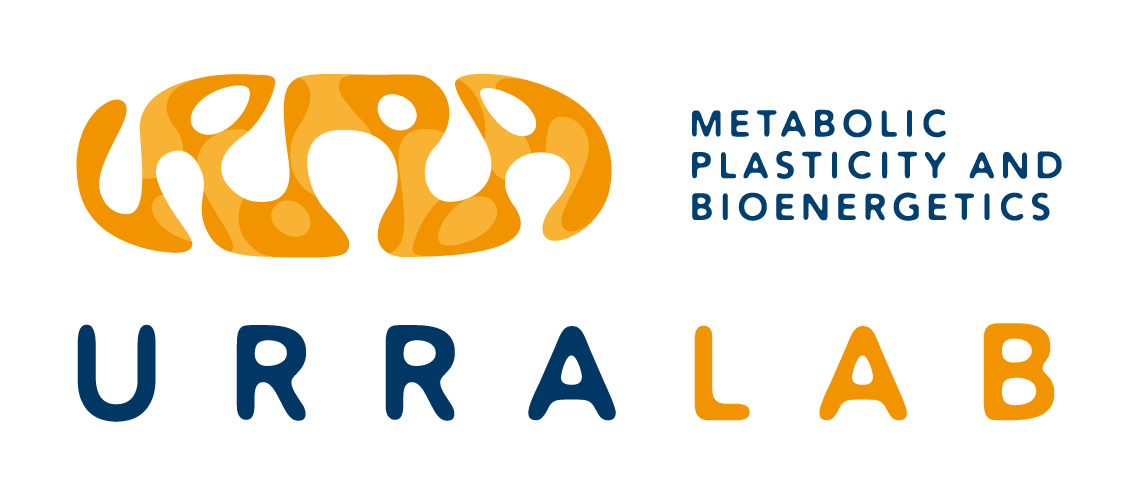MIBI: Interdisciplinary Group on Mitochondrial Targeting and Bioenergetics
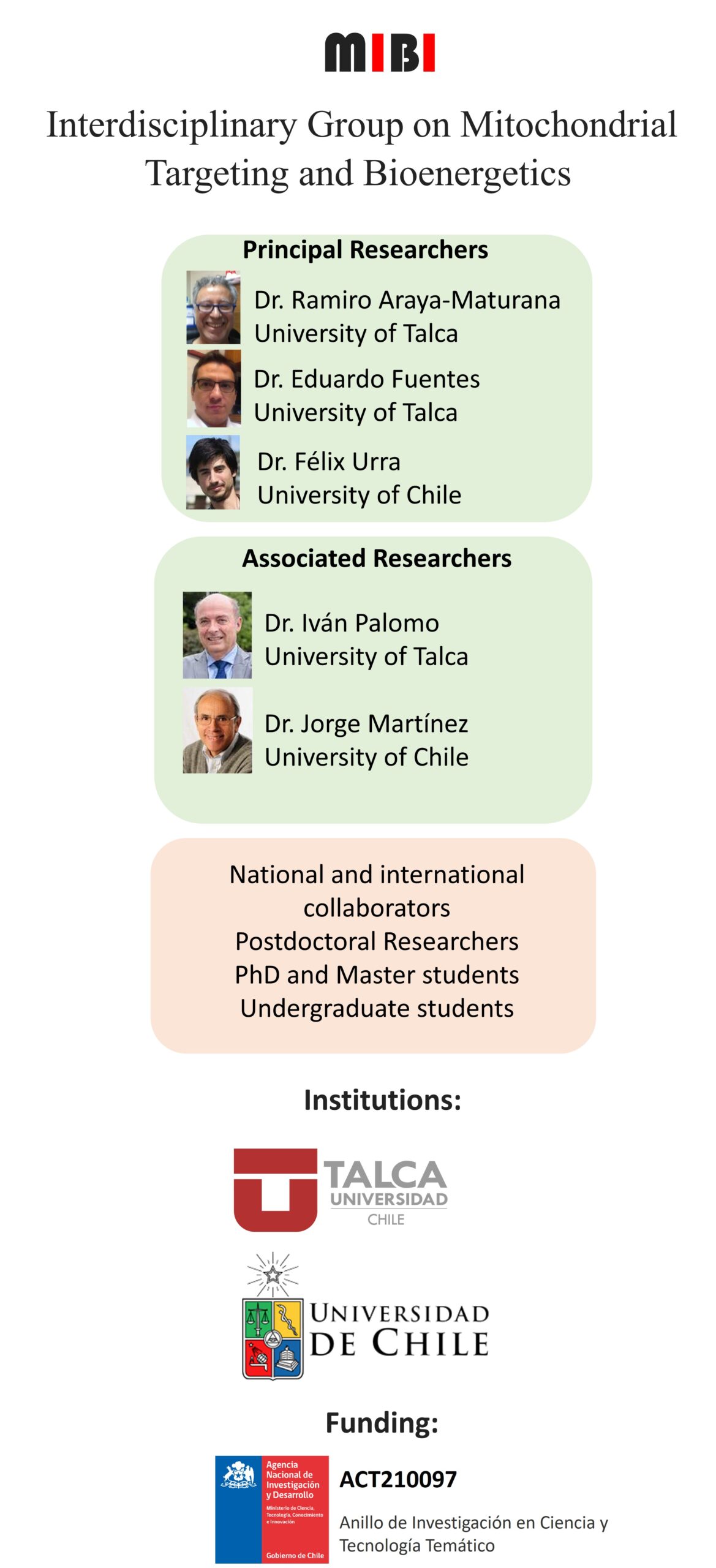
Recently, we were awarded the ANID ACT210097 project allowing the formation of MiBi: Interdisciplinary Group on Mitochondrial Targeting and Bioenergetics focused on studying mechanisms of action of compounds with mitochondrial action and signaling pathways involved in thrombosis and metastases dependent on mitochondrial metabolism.
The involvement of mitochondrial metabolism in tumorigenesis is currently accepted, however, their contribution on migratory/invasive abilities in Breast Cancer cells (BC) and platelet activation induced by chemotherapeutic drugs has not still to be studied. This unexplored topic offers the opportunity to develop novel migrastatic and antiplatelet compounds; for preventing the undesired chemotherapy effects described in some BC patients with a positive response to inhibition of primary tumor mass.
Our main goal is to study the structural requirements of new inhibitors of OXPHOS targets and their effects on metabolism, breast cancer cell migration, activation steps of platelets, platelet-cancer interaction induced by chemotherapeutics.
The obtained knowledge, expertise, and novel methodological approaches (e.g. analysis of migration, interaction platelet-other cells, and metabolism in real-time and omic technologies) have allowed us to gain a better understanding of the underlying mechanisms.
The group partners of MiBi, from the University of Talca and the University of Chile, has developed collaborative research combining both expertise in medicinal chemistry, and basic pharmacological research in cancer and in antiplatelet, operating under the rationale of modulation of mitochondrial metabolism by compounds with antiplatelet and migrastatic effects. This initiative is supported by the participation of international researchers from Spain, Germany, Uruguay, Russia, Brazil, Peru, and the UK.
CALL FOR APPLICANTS
Undergraduate and Master/PhD students and postdoctoral researchers interested in theses or positions, respectively. Positions in Santiago and Talca (Chile) for incorporating in MitoMedChem, MitoPlatelets, and MitoCancer groups are now open!
Please contact to Dr. Félix A. Urra (mail: felixurraf@u.uchile.cl).
MiBi Team:
• MitoMedChem group studies the structural requirements of the lead compounds for the action on the OXPHOS targets.
Dr. Ramiro Araya-Maturana.
Institute of Natural Resources Chemistry, University of Talca, Chile
• MitoPlatelet group studies the effect of pharmacological inhibition of OXPHOS targets on platelet activation steps and platelet-cancer interaction induced by chemotherapeutics.
Dr. Eduardo Fuentes, Dr. Iván Palomo.
Thrombosis Research Center, Faculty of Health Sciences, Universidad of Talca, Chile.
• MitoCancer group studies the outcome of pharmacological inhibition of OXPHOS targets on the pro-metastatic effect induced by chemotherapeutics.
Dr. Félix A. Urra – Metabolic plasticity and Bioenergetics Lab, Faculty of Medicine, University of Chile.
Dr. Jorge Martínez – Cellular and Molecular Biology Lab, INTA, University of Chile.
More information: felixurraf@u.uchile.cl
Summer Course: Biomaterials, Metabolism and Cancer
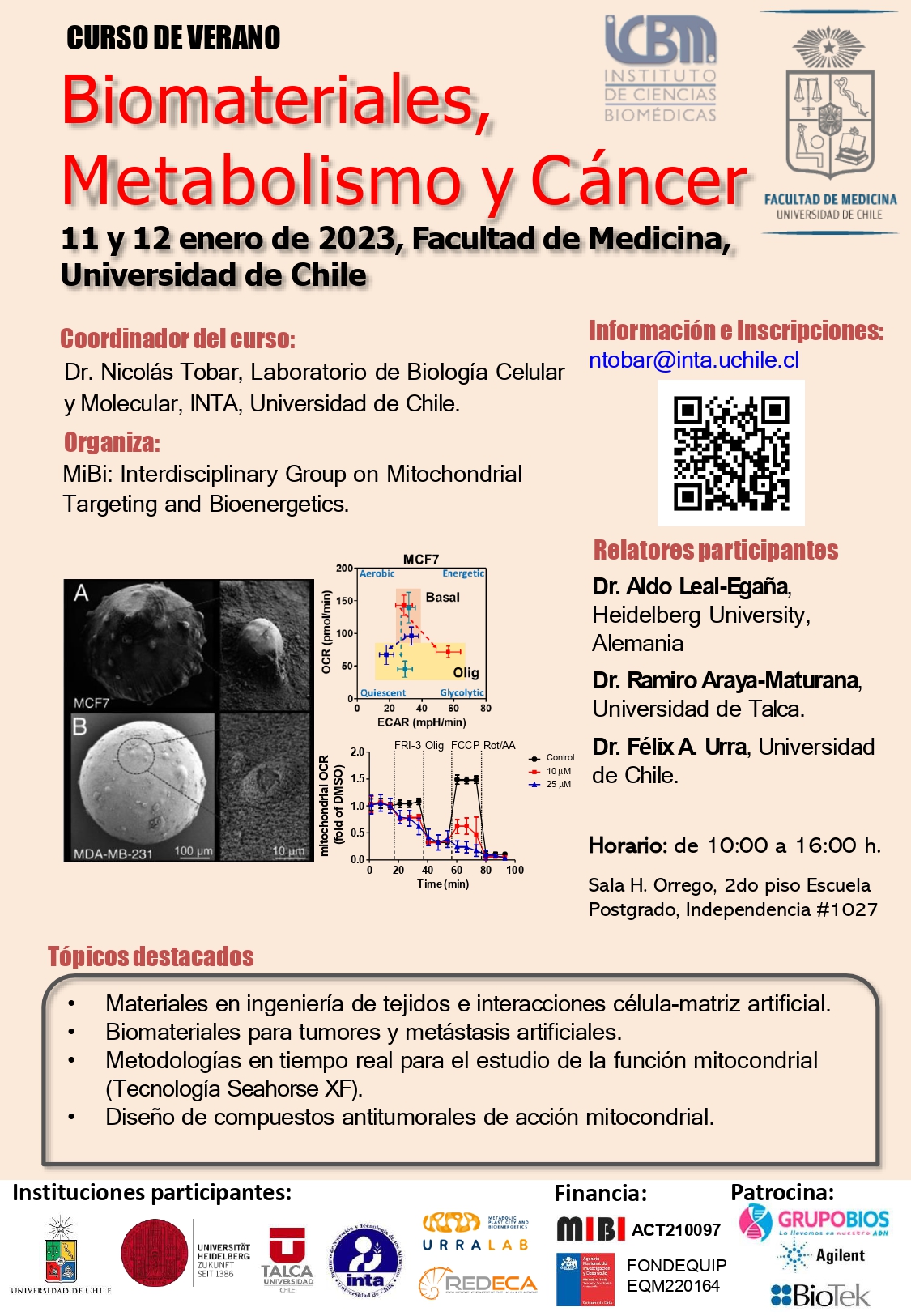
We cordially invite you to participate in the summer course “Biomaterials, Metabolism and Cancer“, which will take place on January 11 and 12, 2023, at the Faculty of Medicine, U. de Chile. In this activity, Dr. Aldo Leal-Egaña (Heidelberg University, Germany), Dr. Ramiro Araya-Maturana (U. de Talca), and Dr. Félix A. Urra (U. de Chile) will participate as speakers. In addition, there will be a session to publicize the fundamentals of XF Seahorse technology, within the framework of our recent FONDEQUIP EQM220164 project.
Hours: 10:00 a.m. – 4:00 p.m.
H. Orrego Room, 2nd-floor Postgraduate School, Independencia #1027, Faculty of Medicine, University of Chile.
Course coordinator:
Dr. Nicolás Tobar, Laboratory of Cellular Biology
and Molecular, INTA, University of Chile.
Organize:
MiBi: Interdisciplinary Group on Mitochondrial
Targeting and Bioenergetics.
Sponsors: GrupoBios and Biotek-Agilent.
Information and Registration:
ntobar@inta.uchile.cl
Course: Pharmacological strategies and methodologies for studying of the mitochondrial function
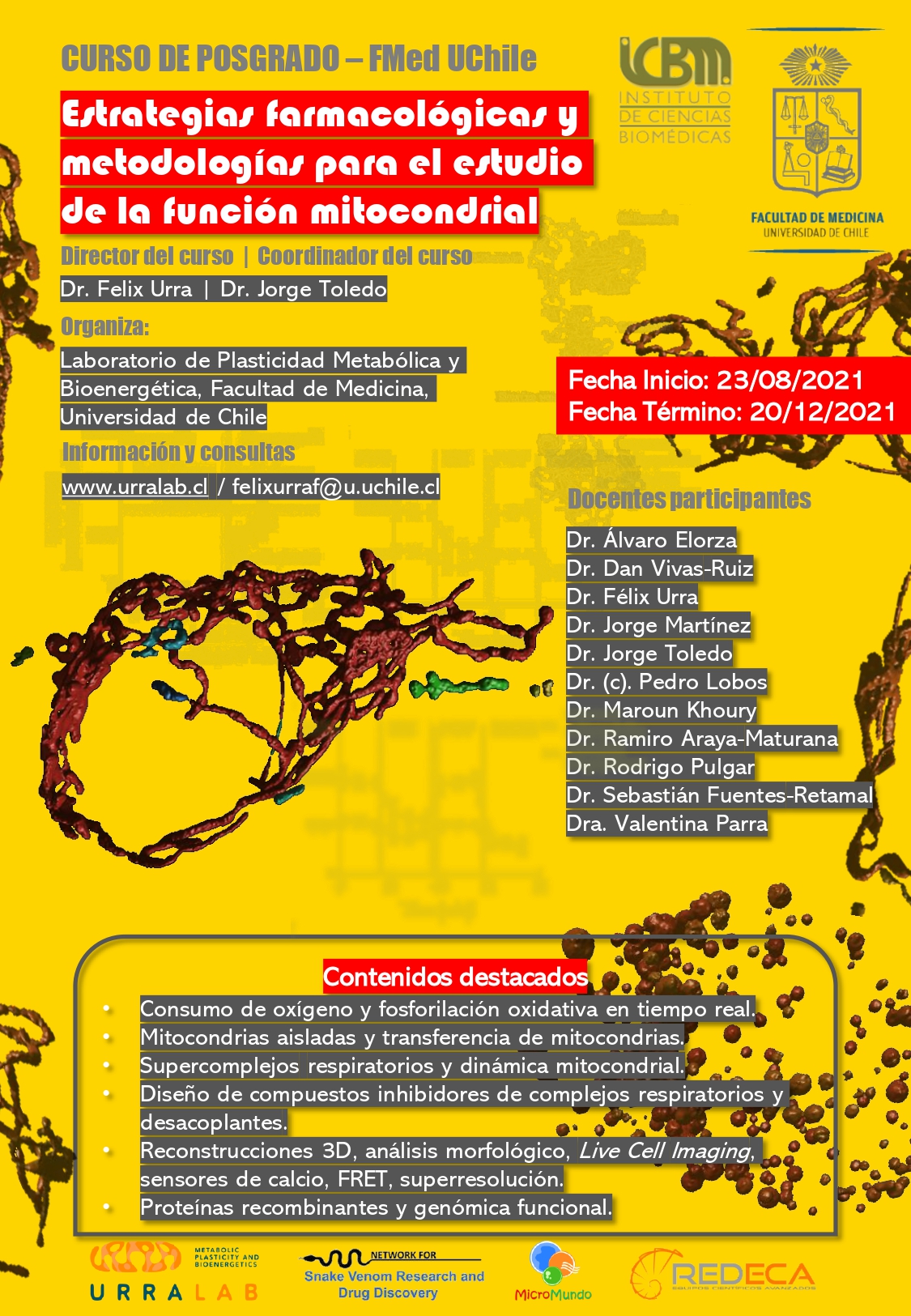
This course is focused on the role of mitochondria in pathologies, validation of targets, and fundaments of advanced methodologies for studying mitochondrial function. To do this, virtual lectures (synchronous), article discussion seminars, methodological strategies, and basic-clinical applications of mitochondrial pharmacology will be addressed. Moreover, this course has theoretical/practical sessions with respirometry techniques (Clark electrode and Seahorse technology), confocal microscopy, time-lapse, and Image analysis.
This course is intended for Master and PhD students at the University of Chile.
Period: 23/08/2021 – 20/12/2021
Monday: 8.30-10.30 h / Tuesday: 14.00-16.00 h
Director: Dr. Félix A. Urra
Coordinator: Dr. Jorge Toledo
Speakers:
Dr. Álvaro Elorza (Universidad Andrés Bello)
Dr. Dan Vivas-Ruiz (Universidad Nacional Mayor San Marcos)
Dr. Félix Urra (Universidad de Chile)
Dr. Jorge Martínez (Universidad de Chile)
Dr. Jorge Toledo (Universidad de Chile)
Dr. (c). Pedro Lobos (Universidad de Chile)
Dr. Maroun Khoury (Universidad de los Andes)
Dr. Ramiro Araya-Maturana (Universidad de Talca)
Dr. Rodrigo Pulgar (Universidad de Chile)
Dr. Sebastián Fuentes-Retamal (Universidad de Chile)
Dr. Valentina Parra (Universidad de Chile)
More information: felixurraf@u.uchile.cl
Network for Snake Venom Research and Drug Discovery
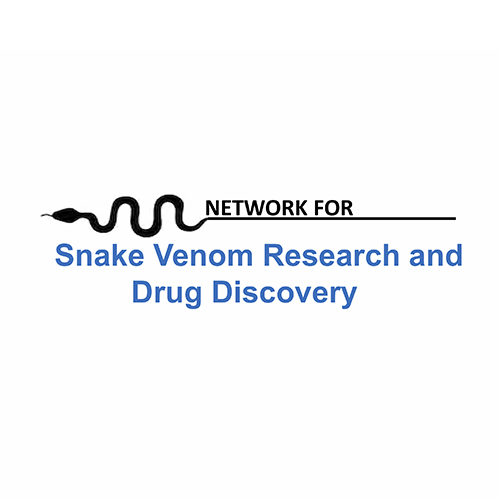
This is an international collaborative network for the study/identification of toxins-encoding genes from representative snake species of South America (Bothrops, Lachesis, Micrurus, Philodryas, Tachymenis genera). It is composed by Principal Investigators of Laboratories of Faculty of Biological Sciences, Major University of San Marcos (Peru), Ezequiel Dias Foundation (FUNED; Brazil), Faculty of Medicine and, INTA, University of Chile and Instituto de Química de Recursos Naturales, Universidad de Talca (Chile). Moreover, we collaborate with international institutions, Museums of Natural History/Herpetological Collections (Perú, Bolivia, Chile and USA) and National Zoo (Chile). We explore 1) the effect of new snake venom toxins on platelet function and coagulation cascade, 2) the neutralization of toxicological activities of medically-relevant venoms by poly/monospecific antivenoms, 3) new small molecules as inhibitors of toxins with enzymatic activities, and 4) molecular mechanism of toxins and recombinant analogs on proliferation, migration and chemoresistance of cancer cells.
For applications of students interested in performing an internship or postgraduate program in our laboratories and more information about Network for Snake Venom Research and Drug Discovery, click here: snake-research.com
Citizen Science: Snakebite Database of Chile
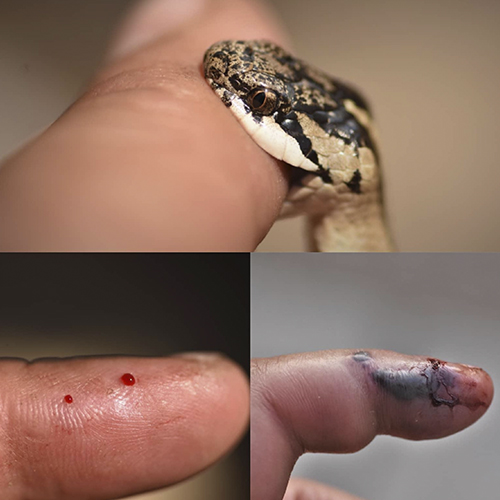
Although evidence concerning snake envenoming caused by Chilean snake species exists from the 1940s, poorly available information on snakebite envenoming situates Chile within countries with insufficient clinical and epidemiological information. Moreover, the apparently low incidence of snakebites and lack of human mortality associated to snake envenoming have led to the underestimation of morbidity and non-inclusion in official health programs. Certainly, this knowledge gap highlights the need for identifying the research focus that requires important contributions for new treatments and effective diagnosis as well as molecular and preclinical information.
We are elaborating the first Snakebite Database of Chile, based on citizen collaboration. If you had an ophidian accident (bites without or with symptomatology), you can participate in filling this form, and we will contact you for studying your case!
Chilean Bulletin of Herpetology – Boletín Chileno de Herpetologia (ISSN 0719-6172)
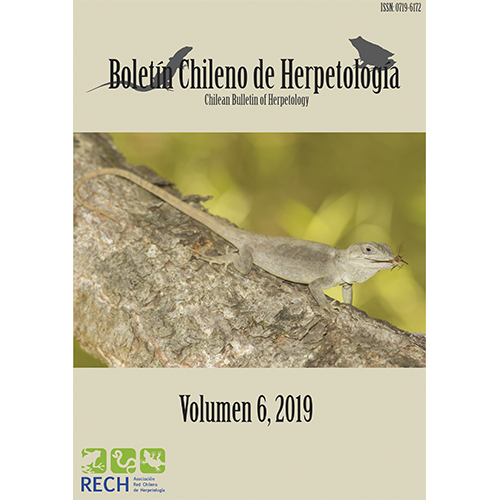
In 2014, Dr. Félix A. Urra, Dr. Damien Esquerré, and Jaime Troncoso-Palacios funded the Boletin Chileno de Herpetologia (Chilean Bulletin of Herpetology), the first and only means of scientific and naturalistic dissemination dedicated to the amphibians and reptiles of Chile. The Bulletin publishes works on taxonomy, biology, and natural history of these animals. As of 2019, the Bulletin formed an alliance with the Red Chilena de Herpetología (Chilean Network of Herpetology (RECH)), and we have extended our editorial body to include experts in different areas that handle the work we receive. The Bulletin is of free-of-charge publication and distribution, no income is generated from it. It is only a disinterested effort for the expansion of our herpetological knowledge. Currently, Dr. Urra is Editor-in-Chief of BCH.
For submission of manuscripts and access to previous volumes, visit: http://www.boletindeherpetologia.com/
Collaborators
Ramiro Araya-Maturana, PhD
Institute of Chemistry of Natural Resources, University of Talca, Chile.
Rodrigo Pulgar, PhD
INTA, University of Chile, Chile.
Luciana Oliveira, PhD
Centro de Pesquisa e Desenvolvimento, Fundação Ezequiel Dias, Minas Gerais, Brazil.
Dan Vivas-Ruiz, PhD
Faculty of Biological Sciences, Major University of San Marcos, Peru
Eduardo Fuentes, PhD.
Thrombosis Research Center, University of Talca, Chile
Marcela Hermoso, PhD.
Faculty of Medicine, University of Chile/University of Groningen, The Netherlands.
Jorge Martinez, PhD.
INTA, University of Chile, Chile
Juan C. Calderón, PhD.
Physis Group, Faculty of Medicine, University of Antioquia, Colombia
Raul Narvaez-Sánchez, PhD.
Physis Group, Faculty of Medicine, University of Antioquia, Colombia
